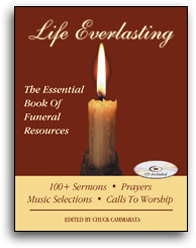The Wonder Of Immortality
SermonStudio
The Wonder Of Immortality
Sermon
Life Everlasting
The Essential Book of Funeral Resources
A sermon on death preached at a regular Sunday service
The Wonder Of Immortality
Revelation 21; 1 Thessalonians 4
The Wonder Of Immortality
Revelation 21; 1 Thessalonians 4


